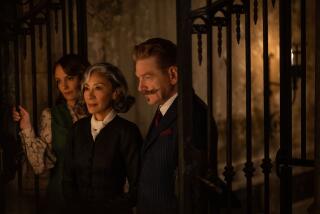Rian Johnson reveals the blueprint for ‘Knives Out’: Hitchcockian suspense with touches of Agatha Christie

“Knives Out” is an attempt to combine an Agatha Christie-style whodunit with a Hitchcock-style thriller. Which was an interesting challenge, because Hitchcock hated whodunits.
For the master of suspense, a whodunit’s pleasures are built on the cheapest of coins — surprise. Two hours of clue gathering for one big wet fart of a surprise at the end. Can you guess whodunit? Probably not, but even if you can, it’s more likely to be from picking a horse rather than actually following the detective’s path of reason, and how satisfying is that?
My problem has always been this: I fundamentally agree with Hitchcock about the dangers of the genre, and yet I love it. I love the musty mansions and haughty patriarchs and matriarchs; I love the rogues’ gallery of snooty suspects getting caught in their lies by eccentric detectives; I love the library denouements and, yes, I love the surprises at the end. I’m a whodunit junkie.
On our last evening in London after we finished shooting “The Last Jedi,” I dragged a big group to St Martin’s Theatre for Christie’s “The Mousetrap,” the longest-running play in West End history, a hoary old whodunit whose dust motes are dusty. And yet … the actors were game and having a blast, and I had a smile plastered on my face the entire time. I loved it.
So the challenge is to reconcile Hitchcock and Christie. For all of Hitchcock’s grumpy dismissiveness of locked room whodunits, if we really examine what sets them apart from his tales of suspense, it’s not that far a leap.
It’s even been done successfully before, “Columbo” being the most obvious example of taking a whodunit and flipping the engine into suspense mode. For those not familiar, every “Columbo” episode begins with the killer committing the crime in plain sight of the audience. We then typically stick with the killer for most of the episode, and Columbo becomes a bit like the shark in “Jaws,” circling and vanishing, then popping up with “one more question.” We wait in suspense to see how Columbo will swoop in for the kill, but we see it through the eyes of the killer, which creates a deliciously twisty game of where our empathy lies. Hitch would approve.
But you don’t even have to go that far afield. Look at Hitchcock’s work. Remove one crucial scene in “Vertigo” (I won’t spoil the scene, but you know what I’m talking about — and if you don’t, stop reading and go watch “Vertigo”), and it becomes a surprise-based mystery. There’s not much difference in terms of plot mechanics between a whodunit and a suspense film; it’s mostly a matter of perspective and whose eyes you see the story through.
Even better, take a close look at Christie’s novels. In her best books she always found a way to inject another driving narrative force beyond clue gathering, be it the proto-slasher movie suspense of “And Then There Were None” or the serial killer stalking of “The ABC Murders.” These Hitchcockian narrative engines also made the eventual obligatory twist more satisfying. Instead of an awaited and unguessable reveal, the mystery’s denouement is just the last swooping hill in an ongoing roller coaster ride.
There’s one other way in which Hitch and Christie are more alike than not. In the traditional Christie whodunit, the first “act” sets the table with a rogues’ gallery of suspects, and one very powerful person who each of them has a reason to hate, who will obviously be the victim. What’s interesting is this: Christie never (or very rarely) draws our sympathies to the victim. The victim is usually a rich or powerful jerk, or at the very least an annoying person.
In that first act, we’re identifying with the potential killers. Does this sound familiar? Their motives have to resonate with us, their predicaments seem desperate and dire enough that if we were in their spot … well, who knows? Christie bends us into identifying with the potential killers. There is nothing more Hitchcock than that.
Hopefully, all of this genre-wonk talk will make a little more sense after you see “Knives Out.” It’s my attempt to join Dame Agatha and Sir Alfred as conspirators in crime. Let’s hope for a successful marriage. Though if I’m wrong and they end up killing each other … well, hell, I’d watch that movie.
More to Read
Only good movies
Get the Indie Focus newsletter, Mark Olsen's weekly guide to the world of cinema.
You may occasionally receive promotional content from the Los Angeles Times.










